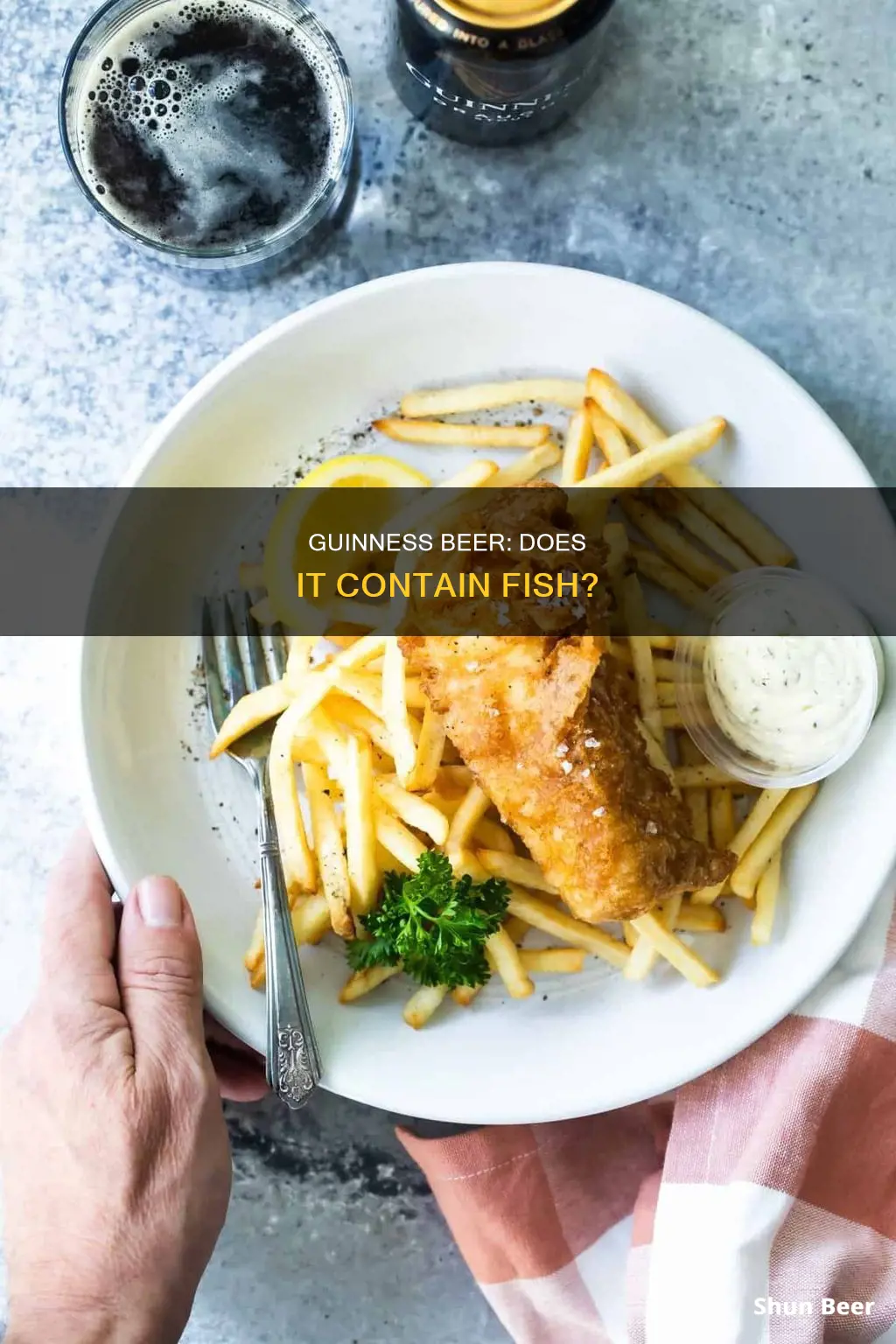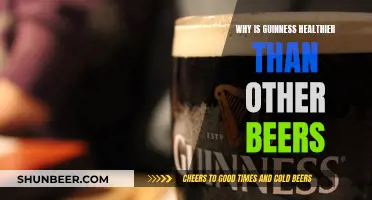
For over two centuries, Guinness beer has been using fish bladders in its filtration process. The gelatinous substance, known as isinglass, is derived from fish bladders, usually from sturgeon, and is used to filter and clarify the ale, ensuring the yeast separates from the liquid. While most of the isinglass is filtered out during brewing, traces of fish bladder can still be found in the final pint. In recent years, Guinness has faced pressure from vegan and vegetarian consumers to remove isinglass from its manufacturing process, and in 2015, the company announced it would implement a new vegan-friendly filtration system. By 2018, all Guinness products worldwide, including draught, bottles, and cans, were confirmed to be isinglass-free and suitable for vegans.
| Characteristics | Values |
|---|---|
| Does Guinness beer contain fish? | Guinness beer used to contain fish guts or fish bladder, but in 2016, the company removed it from the manufacturing process. |
| Why did Guinness beer contain fish? | Fish bladders, or isinglass, are used to filter and clarify the beer and help yeast settle. |
| Why did Guinness remove fish from its recipe? | To cater to vegan and vegetarian consumers. |
What You'll Learn

Guinness' use of fish bladders in its filtration process
For 256 years, the creamy dark stout Guinness has been marketed as a natural blend of barley, hops, yeast, and water. However, the brewing process also involves isinglass, a gelatin derived from fish bladders, usually taken from the sturgeon. This substance is used to filter and clarify the ale, ensuring the yeast separates from the liquid. While most of the isinglass is filtered out during brewing, traces of fish bladder can still be found in the final pint.
The use of fish bladders in the filtration process is not unique to Guinness, and other brewers have been using isinglass for centuries to clarify both beer and wine. However, in recent years, there has been a decline in the use of this technique as new technologies have emerged. Guinness's decision to remove fish guts from its recipe came after months of protesting by vegan beer enthusiasts. The company has been working to eliminate the use of isinglass throughout the production process and has invested in a new, state-of-the-art filtration system at its St James's Gate brewery in Dublin.
In 2015, Guinness announced that it had found a new vegan-friendly filtration system and would begin rolling out fish-less beer in late 2016. The company confirmed that the product would taste the same but would be suitable for vegetarians and vegans. The new filtration system was a response to longstanding campaigns by vegans and two online petitions.
While Guinness may be one of the most famous beers in Ireland, the country's burgeoning craft beer and cider scene has taken a cut of the monolith's recent sales. The decision to remove fish guts from its recipe may be a strategy to appeal to a wider range of consumers, including those with vegan and vegetarian sensibilities.
The Evolution of Guinness Beer: A Historical Perspective
You may want to see also

The removal of fish guts from Guinness' production
The removal of fish guts from Guinness production
In 2015, Guinness announced that it would be removing fish guts from its production process, marking a significant change for the famed Irish brewery. This decision was made to accommodate vegan and vegetarian consumers who had previously avoided the beer due to the presence of fish bladder in the filtration process.
Guinness, like many other brewers, used isinglass, a gelatinous substance derived from fish bladders, to clarify their beer and help separate the yeast from the liquid. While most of the isinglass was filtered out, traces of fish bladder could still be found in the final pint, making it unsuitable for vegan and vegetarian drinkers.
A new filtration system
Guinness's parent company, Diageo, invested in a state-of-the-art filtration system at its St James's Gate Brewery in Dublin, which eliminated the need for isinglass. This new process ensured that the beer remained clear and free of excess yeast without the use of animal products.
A vegan-friendly stout
The removal of fish guts from the production process meant that Guinness could finally label their beer as vegan-friendly. This change was welcomed by vegan and vegetarian beer enthusiasts, who could now enjoy a pint of the famous stout without compromising their beliefs. The company assured drinkers that the recipe and taste of Guinness remained unchanged, only now it was accessible to a wider audience.
A gradual rollout
The initial rollout of the new filtration system focused on Guinness Draught in kegs, with the company confirming in 2016 that all kegs on the market were vegan-friendly. However, it took until 2018 for the company to confirm that all Guinness products worldwide, including bottled and canned formats, were completely isinglass-free and suitable for vegans.
Guinness Beer: Understanding Its Unique Percentage Composition
You may want to see also

Isinglass: the gelatinous substance obtained from fish bladders
Isinglass is a gelatinous substance obtained from fish bladders, specifically from the membrane of the swim bladders of certain kinds of fish. The word "isinglass" comes from the German and Dutch words for "sturgeon bladder", and for centuries, isinglass has been used as a fining or clarifying agent in alcoholic beverages.
In the context of beer and wine production, isinglass is used to remove particles such as yeast, causing it to settle at the bottom of the cask or storage tank. This process, known as flocculation, results in a clear beverage. While beer does not need to be clear and can be hazy, most customers have been conditioned to prefer clear beer.
Isinglass is a form of collagen, and it is obtained by removing the swim bladders from fish, processing them, and drying them. The dried bladders are then formed into various shapes for use. While isinglass was originally made exclusively from sturgeon, particularly beluga, cheaper substitutes using cod or hake were introduced in the late 18th century.
The use of isinglass in beer and wine production has come under scrutiny in recent years, particularly due to concerns from vegan and vegetarian consumers. While most of the isinglass is filtered out during brewing, traces of fish bladder may remain in the final product. As a result, some breweries, including Guinness, have worked to eliminate the use of isinglass and transition to vegan-friendly filtration systems.
Guinness Beer: High Iron Content or Just a Myth?
You may want to see also

The history of Guinness' brewing process
The history of the Guinness brewing process is a long and storied one, dating back to the 18th century when Arthur Guinness founded the brewery. Here is a brief overview of the key moments in the evolution of Guinness's brewing process:
The Early Years (1759-1800s)
Arthur Guinness signed a 9,000-year lease for an old run-down brewery at St. James's Gate in Dublin, Ireland, in 1759. Initially, Guinness brewed pale ales and amber ales, which were the popular styles at the time. However, in 1798, Guinness began experimenting with darker malt, which led to the creation of their first dark beer. In 1799, Arthur Guinness II, the son of Arthur Guinness, stopped brewing ales altogether and focused solely on developing stout recipes.
The 19th Century
In the 19th century, Guinness continued to innovate and expand their business. Arthur Guinness II introduced the West Indies Porter in 1801, which was later renamed Foreign Extra Stout. This beer became the longest continually brewed recipe in Guinness's history and remains one of their most popular beers globally. In 1821, Guinness introduced Extra Stout, a sharper and crisper version of their stout that falls into the classic Irish dry stout category. By the mid-19th century, Guinness was exporting their beers to various destinations worldwide, including England, South Carolina, Sierra Leone, Portugal, and Barbados.
The 20th Century
The 20th century saw significant changes and advancements in the Guinness brewing process. In 1951, Guinness hired Michael Ash, a scientist and mathematician, to solve the "draught problem" and create a consistent, creamy pint. Ash's invention of nitrogenation transformed the beer, giving it a creamy head and smooth texture. This innovation also led to the creation of what is now known as Irish stout. In 1959, on the 200th anniversary of the lease signing, Guinness Draught was launched, introducing nitrogen to the brewing process. This changed the beer's appearance and taste, giving it the iconic creamy white head and famous two-part pour.
The 21st Century
In the 21st century, Guinness continued to adapt and expand their brewing operations. In 2015, they opened a brewery in Baltimore, Maryland, to be part of the innovative and creative beer community in the United States. Guinness also made their beer suitable for vegetarians and vegans by introducing a new filtration process that avoided the use of isinglass from fish bladders. Additionally, Guinness has expanded its portfolio to include various beer styles, such as lagers, IPAs, and wheat beers, while also experimenting with new ingredients and processes.
Guinness Beer and Caffeine: What's the Connection?
You may want to see also

Other animal products in common food items
For centuries, Guinness used isinglass, a gelatin derived from fish bladders, to filter and clarify its beer. However, in 2015, the company announced it would be removing fish guts from its recipe to make its beer vegan-friendly. This change came after months of protesting by vegan beer enthusiasts.
The presence of isinglass in Guinness is just one example of how animal products can be found in unexpected places. Here are some other common food items that contain animal products:
Dairy Products and Cheese
Animal rennet, an enzyme sourced from the stomachs of newborn calves, is used in the production of many types of cheese, including Parmigiano Reggiano (parmesan), gruyere, gorgonzola, and camembert. This means that strict vegetarians and vegans need to be cautious when consuming cheese or dishes containing cheese, such as pesto.
Sugar
The refining process for white and brown sugar often involves the use of bone char, a granular material derived from animal bones. This process helps remove color from the sugar, giving it a crystalline, white appearance. As a result, many sugar products are not suitable for vegans.
Gummy Candies and Gelatinous Desserts
Gelatin, a jelly-like substance made from collagen, is commonly found in gummy candies, marshmallows, and gelatinous desserts like Jell-O. Gelatin is derived from animal bones, tendons, ligaments, and/or skin, and it is used to give these treats their signature texture.
Cosmetics and Beauty Products
Collagen, lanolin, keratin, and hyaluronic acid are all compounds derived from animals and are commonly found in cosmetics and beauty products. These substances are valued for their ability to smooth and strengthen skin, hair, and nails. Guanine, derived from fish scales, is also used in shimmery cosmetics like nail polish and lipstick.
Processed Foods
Some processed foods, like cake mixes and cupcakes, may contain beef fat or dehydrated versions of it. Additionally, many red foods derive their color from carmine, a dye produced by crushing cochineal beetles. This dye is also found in some yogurts and candies.
These examples highlight how animal products can be found in unexpected places, and it underscores the importance of due diligence for those following vegan or vegetarian lifestyles.
Guinness Beer: Unveiling the Secret of Its Strength
You may want to see also
Frequently asked questions
Yes, Guinness beer has contained fish bladder products since it was first brewed 256 years ago.
The swim bladders of fish are used to create isinglass, a gelatinous substance used to filter and clarify the beer.
Guinness has removed fish bladders from its brewing process to make its beer vegan-friendly.
Guinness announced it would stop using fish bladders in 2015, with all kegs of Guinness on the market being vegan-friendly by April 2016.
Yes, isinglass is widely used in the beer and wine industry.







